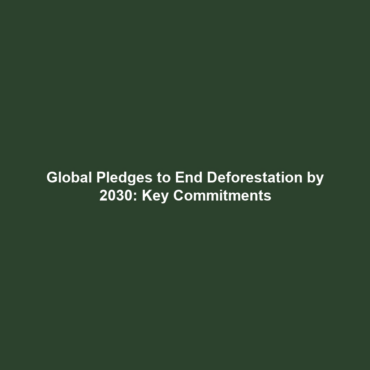<>
National and International Pledges to Halt Deforestation by 2030
In recent years, the global community has recognized the critical need to halt deforestation as a means to combat the escalating crisis of biodiversity loss. Initiatives such as the Glasgow Leaders’ Declaration on Forests and Land Use underscore an urgent commitment by nations to restore and sustainably manage forests by 2030. This article delves into the significance of such pledges and their broader implications within the realms of deforestation and biodiversity loss.
Key Concepts
The national and international pledges to halt deforestation by 2030 are built on several pivotal concepts:
- Commitment to Zero Deforestation: Countries involved pledge to end forest loss and restore degraded lands, fostering an ecosystem that supports both humanity and wildlife.
- Sustainability: Emphasis on sustainable land use practices promotes the conservation of biodiversity while meeting human needs.
- Collaboration: These pledges signal a cooperative approach among nations, industries, and local communities to enhance forest management strategies.
Applications and Real-World Uses
The practical applications of these national and international pledges are far-reaching in the context of deforestation and biodiversity loss. Here are notable examples:
- Policy Frameworks: Countries are developing stricter laws and regulations aimed at protecting forest environments.
- Funding Initiatives: Financial investments are being channeled into reforestation projects, showcasing how international commitments can lead to real-world action.
- Community Engagement: Local communities are receiving support to implement sustainable agricultural practices that protect forests.
Current Challenges
Despite strong commitments, several challenges impede the effectiveness of these pledges in addressing deforestation and biodiversity loss:
- Lack of Enforcement: National policies are often poorly enforced, leading to continued illegal logging and deforestation.
- Economic Pressures: Immediate economic gains from deforestation often overshadow long-term sustainability goals.
- Insufficient Funding: While financial pledges exist, many countries struggle to secure the necessary investments for effective implementation.
Future Research and Innovations
Looking ahead, innovative research and emerging technologies present opportunities to enhance national and international efforts to halt deforestation:
- Satellite Monitoring: Advances in satellite technology enable better tracking of deforestation rates, improving accountability.
- Biotechnology: Research into genetically modified crops that require less land could minimize the agricultural pressure on forests.
- Blockchain Technology: This technology is being explored for transparent supply chains that ensure products are sourced sustainably.
Conclusion
In conclusion, national and international pledges like the Glasgow Leaders’ Declaration on Forests and Land Use play a pivotal role in addressing the urgent crises of deforestation and biodiversity loss. The collective commitment to halt deforestation by 2030 is a crucial step towards sustainable development. To learn more about the impact of these initiatives, visit our articles on sustainable forestry and biodiversity preservation. Let us work together towards a future where our forests are protected for generations to come.

Leave a Reply